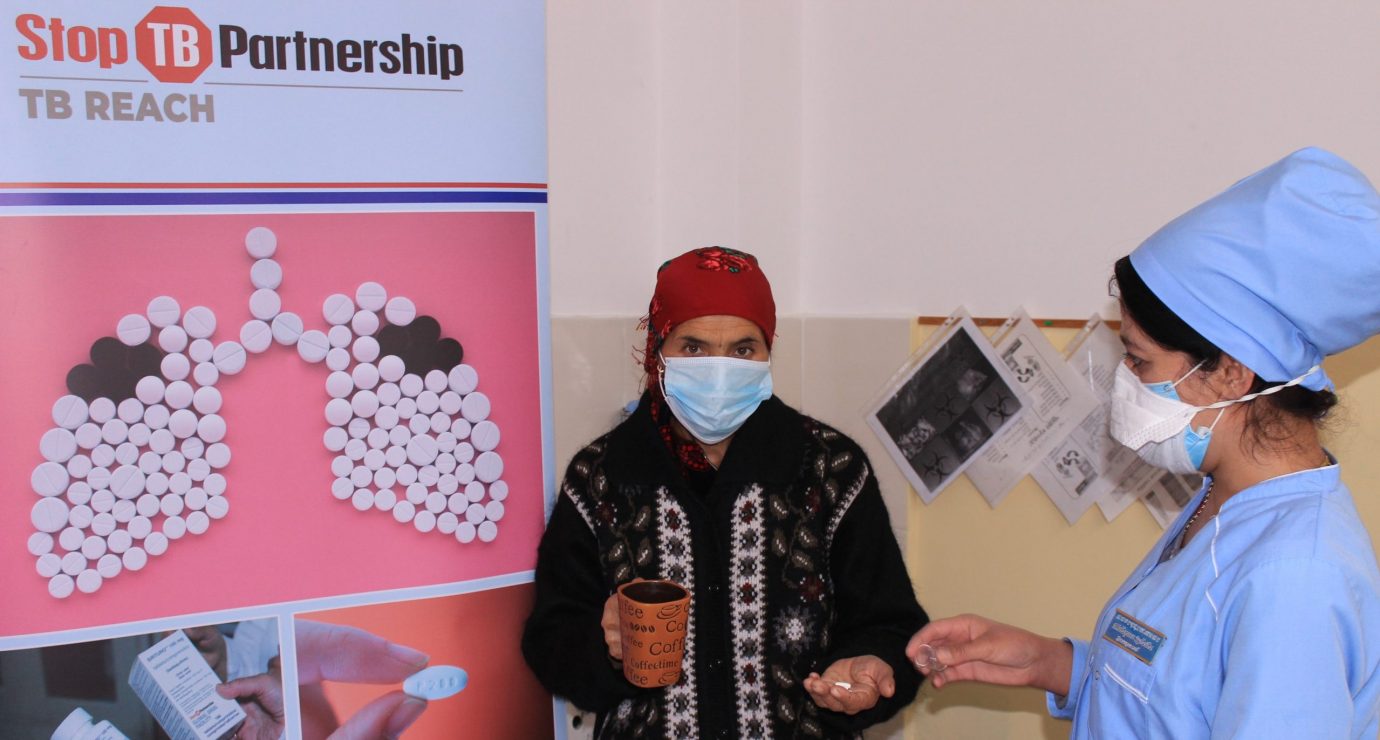Tajikistan is the first country in Central Asia to provide people with tuberculosis (TB) access to the groundbreaking new BPaL treatment under operational research conditions. This six-month, three-drug treatment is meant for people with extensively drug resistant TB (XDR-TB) and is expected to have a higher success rate than previous treatments which lasted at least 20 months, doing away with painful daily injections. “This is great news for the fight against TB in Tajikistan. It can save many lives”, says Agnes Gebhard, technical director of KNCV Tuberculosis Foundation.
The BPaL regimen (consisting of the drugs pretomanid, bedaquiline and linezolid) was developed by TB Alliance and is implemented in Tajikistan by the National TB Program (NTP), with support from KNCV Tuberculosis Foundation (KNCV). The Project is titled “Evidence generation for shorter MDR/XDR-TB treatment in Tajikistan” and is funded through KNCV by the Stop TB Partnership’s TB REACH Initiative.
NTP Deputy Director Shakhnoza Azamova says: “We are very pleased about the start of the operational research on the new BPaL treatment regimen in Tajikistan. I think that introduction of the new regimen and the new drug pretomanid will improve the results of treatment of people with drug-resistant TB significantly and subsequently reduce the spread of drug-resistant TB in our society”.
New hope for people with drug resistant TB
Tuberculosis kills 1.4 million people worldwide every year. It re-emerged in Tajikistan as a major public health threat after the breakdown of the Soviet Union. According to NTP figures, a total of 5976 TB patients were registered in the country in 2019, of whom 713 patients had drug-resitant TB (DR-TB), including XDR-TB. The high burden of drug resistance is the key challenge for effective TB control in Tajikistan.
Most people can be cured of TB with a standard, inexpensive treatment. However with XDR-TB conventional drugs do not work. Treatment is much longer (20 – 24 months) and less effective. According to the WHO, the cure rate of XDR-TB worldwide is only 43 percent. However the new BPaL regimen (6 months, without injections) has shown a cure rate of 90 percent in clinical trials, according to Phase 3 trial results published in the New England Journal of Medicine.
The BPaL regimen is available through the Stop TB Partnership’s Global Drug Facility at a cost under US$1000 per six-month treatment course. The cost of existing 20-24 months treatments for highly drug-resistant forms of TB in Tajikistan is US$3500 per patient. The BPaL regimen there for also represents a significant saving for the Ministry of Health per patient treatment cost.
Hope for Aietbegim
For citizens of Tajikistan like 48-year old Aietbegim (pictured above), who previously had little hope of surviving XDR-TB, the BPaL regimen means a good chance to be cured. She is the very first person who was enrolled to the BPaL regimen in the country and is currently under treatment. Aietbegim: “I hope, I hope again… This new treatment is my last hope to recover and I will try all my best to conquer TB because I love life and love my little daughter who needs her mother. Let the illness and treatment be in the past. Now is a new start in my life and I am sure this time my recovery will be complete.”
Further roll-out and scale-up of BPaL
The BPaL regimen has been approved by the U.S Food and Drug Administration (FDA), the European Medicines Agency (EMA), the Drug Controller General of India and recommended by the WHO under operational research conditions. The safety and effectiveness of BPaL in Tajikistan are being monitored. In this way, it contributes to increasing scientific evidence for new shorter treatment methods.
Beyond Tajikistan, KNCV supports the introduction of the BPaL regimen in Kyrgyzstan, Ukraine, Uzbekistan, Myanmar, Vietnam, the Philippines and Indonesia, through the LIFT-TB project. This is funded by the Korean International Cooperation Agency (KOICA) and TB Alliance and implemented in collaboration with ITRC and KNCV. In Nigeria KNCV supports introduction of the BPaL regimen with the support of a Dutch Foundation (SMT).
The Stop TB Partnership is a United Nations hosted entity based in Geneva, Switzerland, committed to revolutionizing tuberculosis (TB) space to end the disease by 2030. The organization aligns more than 2,000 partners worldwide to promote cross-sectoral collaboration. The Stop TB Partnership’s various teams and initiatives take bold and smart risks to identify, fund and support innovative approaches, ideas, and solutions to ensure the TB community has a voice at the highest political levels and that all people affected with TB have access to affordable, quality, and people-centered care. Learn more at www.stoptb.org and follow us at @StopTB.
KNCV Tuberculosis Foundation has been fighting TB since its establishment in 1903. Over these 117 years, the organization has acquired indispensable knowledge and experience in the field of effective TB control, resulting in significant contributions to global evidence generation, policy development and TB program implementation worldwide. KNCV has extensive international technical experience in supporting those countries preparing to introduce new drugs and regimens and is involved in BPaL implementation in over ten countries with a high XDR-TB burden.

